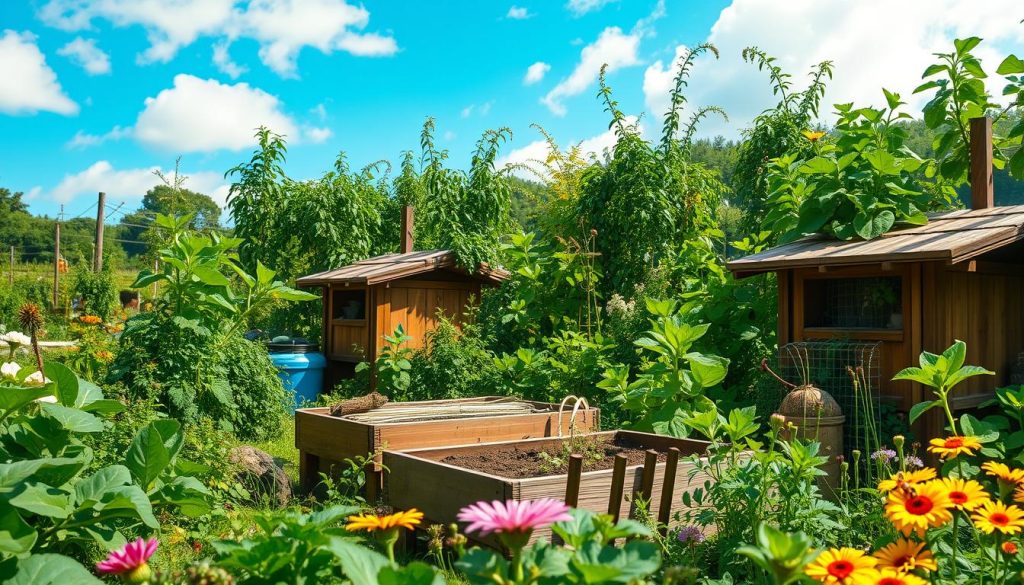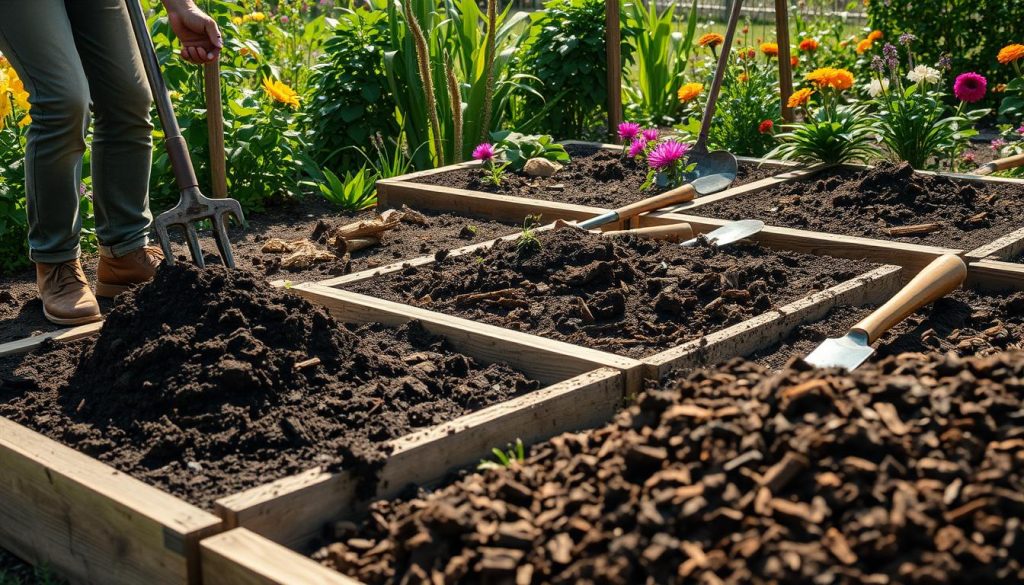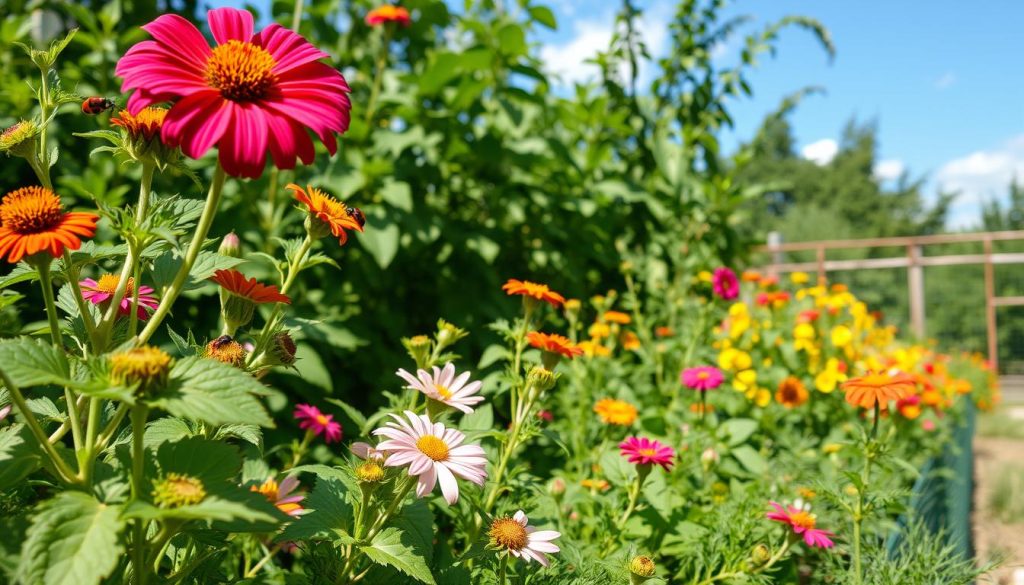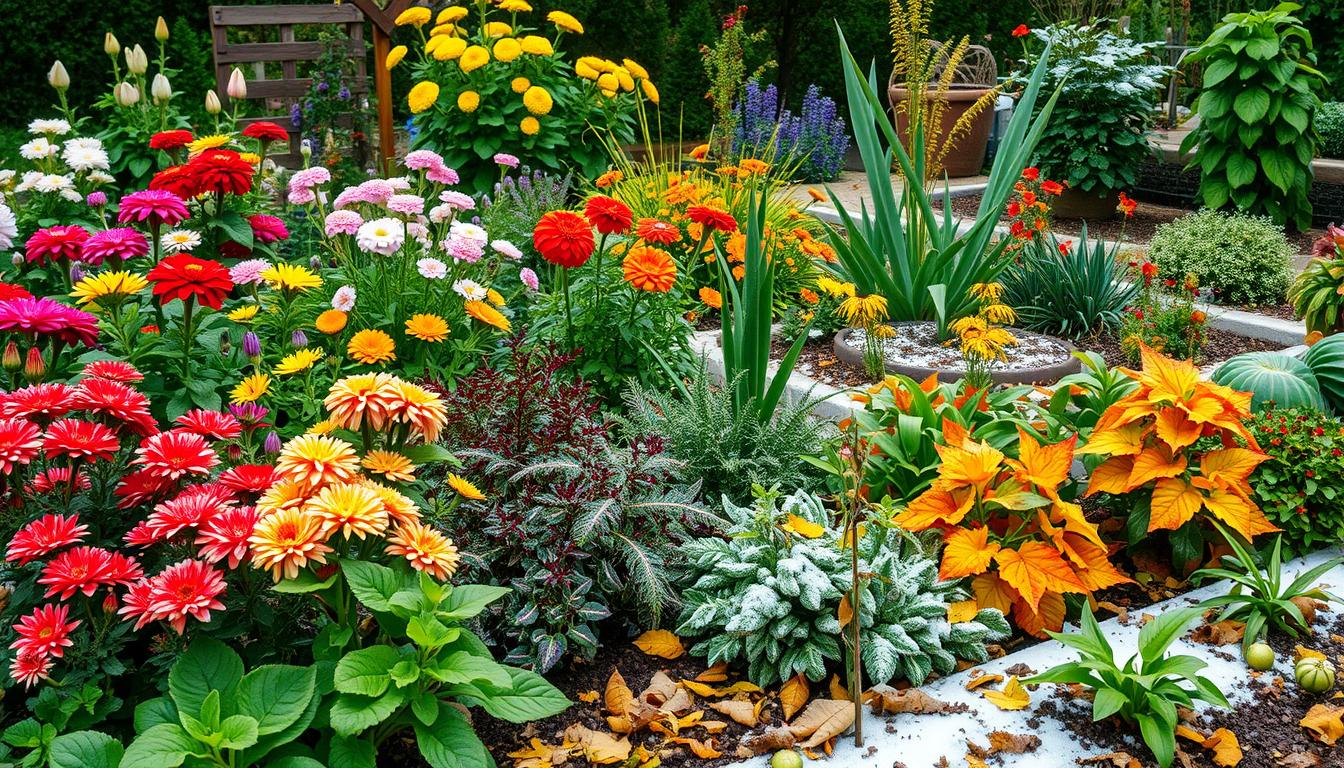As a gardener, I aim to give you a detailed guide to growing a garden all year. I’ll share tips on seasonal gardening and year-round techniques. This will help you create a lush outdoor space with a well-planned gardening calendar.
I want to help you maximize your outdoor space. Whether you’re into Seasonal and Year-Round Gardening or just want to improve your garden, I’ve got you covered.
The Joy of Seasonal Gardening
As a gardener, I’ve learned to love each season’s unique charm. Whether you’re new or experienced, knowing the seasons is key. With planning and knowledge, you can make a garden that shows off each season’s best.
For beginners, starting with a good planting guide is crucial. Also, think about landscaping that fits your surroundings.
To begin, let’s look at each season and the plants that do well in them. Here are some important points for each season:
- Spring: Plant bulbs, flowers, and veggies that like cooler weather, like lettuce and peas.
- Summer: Focus on crops that love the heat, like tomatoes, peppers, and eggplants.
- Autumn: Plant cool-season crops like broccoli, kale, and carrots.
- Winter: Think about planting evergreen trees, shrubs, and perennials for year-round interest.
By knowing each season’s unique traits and choosing the right plants, you can create a beautiful outdoor space. It will change and grow with the seasons. With a good guide and creativity, you can enjoy the beauty of each season in your garden.
Year-Round Gardening Benefits
Exploring year-round gardening opens up a world of benefits. It can make your home look better and help the planet. By using sustainable gardening practices, you can make your outdoor space beautiful and eco-friendly.
Year-round gardening has many advantages:
- It improves air quality with organic gardening methods.
- It boosts biodiversity with a variety of plants and flowers.
- It enhances mental and physical health through regular garden care.
To keep your garden healthy all year, focus on maintenance. This means watering, pruning, and fertilizing regularly. Also, use eco-friendly products to reduce your environmental impact. These practices make year-round gardening rewarding and help the planet.

Organic gardening and regular maintenance can turn your outdoor space into a serene oasis. It’s great for both new and experienced gardeners. Year-round gardening improves your home’s look and helps the environment.
Essential Tools for Successful Gardening
Having the right tools is key for a thriving garden. Whether you’re new or experienced, quality tools make a big difference. We’ll look at must-have tools for all seasons, year-round care, and eco-friendly gardening.
Choose tools that are durable, easy to use, and fit your needs. A garden fork, pruning shears, and a watering can are essential. They help with planting, pruning, and watering, keeping your garden healthy.
Must-Have Tools for Seasonal Gardening
- Garden fork for turning over soil and preparing beds
- Pruning shears for trimming and shaping plants
- Watering can for gentle and efficient watering
Also, think about eco-friendly gardening tools. These are made from sustainable materials and reduce waste. Look for bamboo handles, recycled metal, and biodegradable materials.
Year-Round Garden Maintenance Tools
For year-round care, you need tools for pruning, weeding, and fertilizing. A garden hoe, cultivator, and fertilizer spreader are important. They help keep your garden in top shape all year.
Investing in the right tools makes gardening easier and more fun. Whether you’re new or experienced, the right tools help you reach your gardening goals. With the right tools and practice, you’ll enjoy gardening’s many benefits, including caring for your garden and connecting with nature.
Soil Preparation Techniques
To make your garden thrive, focus on soil preparation. This step improves soil quality, which is key for plant growth. As a gardener, I’ve found that soil care is a year-round task. It involves seasonal changes and ongoing attention.
Soil quality is the heart of a healthy garden. It gives plants the nutrients, water, and air they need. To boost soil quality, test it to find out its pH level and nutrient content. Then, add seasonal amendments like compost, manure, or fertilizers to make it more fertile.
Importance of Soil Quality
Good soil quality is vital for plant growth. It helps roots grow, water soak in, and nutrients get absorbed. Bad soil quality can cause plant diseases, pests, and lower yields. By focusing on soil preparation and using seasonal amendments, you can make your garden flourish.
Seasonal Amendments
Seasonal amendments are key in soil preparation. They include organic matter, fertilizers, or other soil conditioners to enhance soil structure and fertility. Some seasonal amendments are:
- Compost: adds organic matter and nutrients to the soil
- Manure: provides nutrients and improves soil structure
- Fertilizers: supplies essential nutrients for plant growth

Year-Round Soil Care Tips
To keep soil healthy, follow year-round care tips. These include mulching, cover cropping, and avoiding soil compaction. By using these tips and seasonal amendments, you can create a garden ecosystem that supports plant growth.
Planting Strategies for Success
To make your garden thrive, using smart planting strategies is key. I’ve found that companion planting, crop rotation, and knowing when to plant are vital. These help your garden grow well and look great.
When planning your garden, think about the soil, weather, and what each plant needs. For instance, planting marigolds with tomatoes can keep nematodes away. Crop rotation keeps the soil healthy and fights pests and diseases.
- Companion planting: Pairing plants that benefit from each other’s growth
- Crop rotation: Rotating crops to maintain soil fertility and reduce pests and diseases
- Seasonal vs. year-round planting: Planting according to the season to ensure optimal growth and productivity
Using these strategies can make your garden flourish. Choose plants that fit your climate and soil. Don’t hesitate to try new ways to see what works best for you.
Pest and Disease Management
As a gardener, I know how vital pest and disease management is. It keeps our gardens healthy and growing well. We must stop pests and diseases from harming our plants and crops.
Identifying Common Garden Pests
Aphids, whiteflies, and spider mites are common pests. They can be spotted by their looks and actions. We can fight them with organic helpers like neem oil and insecticidal soap.
Organic Solutions for Pest Control
For pest control, we use physical barriers like fine mesh. We also bring in good bugs like ladybugs and lacewings to eat pests. Organic sprays like pyrethrin and diatomaceous earth help too.
Important things to remember for pest and disease control are:
- Keep an eye on your plants for pests and diseases
- Use organic ways to fight pests
- Keep your garden clean by removing weeds and trash

By following these tips and using organic methods, we can keep pests and diseases away. This way, our gardens stay healthy and full of life.
Creative Gardening Techniques
As a gardener, I’m always searching for new ways to use my outdoor space. Creative gardening is key, using methods like vertical and container gardening. It’s also about using cover crops. These methods help create a stunning garden, even in tight spots.
Vertical gardening is great for small spaces. It lets you grow plants like vines and flowers on walls or trellises. It’s ideal for city gardeners with little room.
Benefits of Vertical Gardening
- Maximizes space: Vertical gardening lets you grow plants in tight spots, perfect for city gardens.
- Increases yields: Growing plants up can boost your harvest, giving you more to enjoy.
- Improves air quality: Plants clean the air by taking in carbon dioxide and releasing oxygen.
Container gardening is another creative approach. It involves growing plants in pots instead of the ground. This method is great for growing plants all year, even indoors in winter. It also adds color and texture to your garden.
Tips for Container Gardening
- Choose the right container: Pick one that’s big enough for the plant’s roots and has good drainage.
- Use a well-draining potting mix: This mix prevents waterlogged soil and root rot.
- Fertilize regularly: Regular fertilizing helps plants grow strong and bloom well.
Using creative gardening like vertical and container gardening can transform small spaces into beautiful gardens. These methods help you use your outdoor space well. They bring many benefits, like fresh food, cleaner air, and a closer connection to nature.
Resources for Gardeners
Starting your gardening journey, whether it’s for a season or all year, can be exciting. Having good resources can really help. I’ve put together a list of books, online groups, and local clubs to make your gardening better.
Books and Guides for Seasonal Gardening
Looking through gardening books and guides can teach you a lot. “The Vegetable Gardener’s Bible” by Edward C. Smith and “The Old Farmer’s Almanac Guide to Vegetable Gardening” are great examples. They give you tips on planning, planting, and keeping your garden healthy all year.
Online Communities and Forums
Joining online gardening groups can change your gardening game. Sites like the National Gardening Association’s forums and Reddit’s r/gardening subreddit are full of gardeners. You can ask questions, share your experiences, and get ideas from others. These places keep you up-to-date and connected with gardening.
Local Gardening Clubs and Resources
Getting involved in your local gardening scene can be very rewarding. Joining a local club or contacting your cooperative extension office can connect you with other gardeners. You’ll find workshops and hands-on learning that fit your area’s climate and growing needs.
Using these different resources will help you grow a great garden. You’ll improve your gardening skills, whether you’re gardening seasonally or all year.

